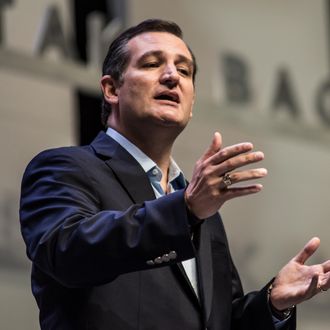
At the Republican Jewish Coalition forum yesterday, U.S. senator Ted Cruz made a rather astounding assertion that has now become part of his stock speech: There are 54 million Evangelical voters who stayed home in 2012, and that’s more than enough to provide a margin of victory for someone very much like Cruz.
At The Wall Street Journal today, Gerald Seib expresses his deep skepticism about the math involved in Cruz’s claim. Of the purported 90 million Americans who are identified loosely as Evangelicals (and the definition itself is not an easy one), many are African-Americans not inclined to vote for Ted Cruz or any Republican; 28 percent are self-identified Democrats (according to Pew’s numbers); and others just aren’t into politics. I’d add that a decent number of them “stayed home” because they are not old enough to vote. And the insinuation that all nonvoters are making a conscious decision to “stay home” because of the choices they have been offered is, to use a technical term, ridiculous.
Earlier this week the Cook Political Report’s estimable Amy Walter took a long look at Cruz’s “mobilize the base” strategy and the underlying math (though she quoted not the 54 million figure but Cruz spokesperson Rick Tyler’s 30 million number for the missing voters his candidate could reasonably get to the polls) and found it all pretty dubious.
It’s hard to find any data to support this theory. First, identifying evangelical voters is not as easy as identifying other characteristics of voters like age, sex or race. There’s no way to roll into a district and know which voters there are evangelical. However, the Cruz campaign and others argue that finding these voters isn’t all that hard since we know where they are most Sunday mornings. What we know empirically about evangelical voters is from polling and, more specifically, from exit polls. And, on that front, there’s no evidence of a “slump” in 2012.
In 2004, evangelical voters made up 23 percent of the electorate and George W. Bush carried that group with 78 percent. In 2012, evangelical voters made up an even larger share of the electorate - 26 percent – and Romney won this group with an equal 78 percent of the vote.Even Ralph Reed, a leader of the evangelical wing of the party, argued right after the 2012 election that evangelical turnout was at an all-time high in 2012.
[T]he biggest problem with the “conservative base turn-out theory” is that it assumes a campaign in a vacuum. Is it structurally possible for a Republican to win a national election getting a bigger share of white, evangelical and conservative voters? Yes, but only if the Democratic coalition doesn’t turn out. However, in order for Cruz to ‘motivate’ his base, he’s going to have to focus on the cultural and social issues that would in turn get younger and minority voters fired up: immigration, gay marriage, and abortion. Plus, these social and cultural issues would also push an even bigger share of the “moderate” vote to Hillary Clinton.
Cruz isn’t the only 2016 presidential candidate with an unusual electability argument. You often hear supporters of Bernie Sanders touting a hidden majority of “populists” that extends deep into the current GOP-leaning white working class. Rand Paul claims he can build a unique coalition that includes a higher percentage of young and minority voters than Republicans typically attract. Some of Dr. Ben Carson’s fans believe he could win a preposterous share of the African-American vote. Despite mixed evidence about his appeal to non-Cuban Latino voters, many Marco Rubio supporters think he can solve the GOP’s Latino problem, perhaps permanently. And Donald Trump’s current strong showing among marginally likely to vote non-college-educated folk allows him to imply (he does not, of course, say this out loud) that Republicans could sacrifice the minority voters his nomination might repel and still win.
These are mostly debatable propositions. But by choosing such an insanely enormous figure for his “hidden majority,” Ted Cruz the skilled communicator is hustling pure snake oil.






























